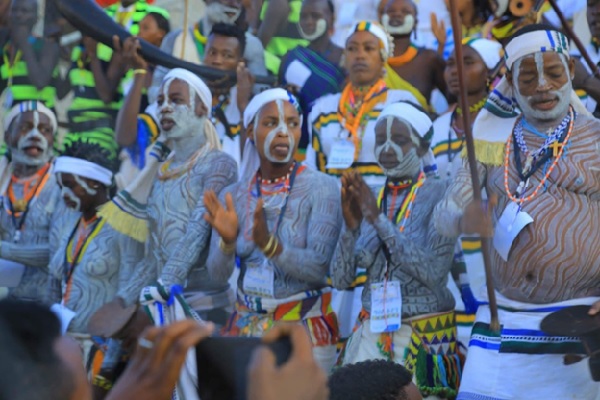
BY LEULSEGED WORKU
The Nations Nationalities and Peoples’ of Ethiopia are the foundations of the great land-Ethiopia. It is impossible to think about Ethiopia without the harmonious relationships of these nations, nationalities and peoples. The culture of one ethnic group is the culture of the other. The historical identity of one group is the wealth of the other.
There were times when Ethiopian Nations, Nationalities and Peoples’ were deprived of their basic human and democratic rights. There were also times when some ethnic groups were used as a “Trojan horse” to quench the political interest of some groups. However, through time this trend has changed, though it is not at the desired level, and Ethiopians are benefitting from their constitutional rights irrespective of their identities.
Marking the Nations, Nationalities and Peoples’ Day (NNPD) and the right to self-determination is one of the constitutional rights Ethiopian people are enjoying. Using this as a ground, The Ethiopian Herald had moments of togetherness with scholars to hear their reflection with regard to the importance of the NNPD.
Dr. Tadesse Fikere, is a lecturer at Hawasa University. For him, Nations, Nationalities and Peoples’ Day has a special meaning to Ethiopians in general and the people of Sidama in particular. “This year’s NNPD is a day when we, Ethiopians, demonstrate our unity in diversity to the world. As the day signifies Ethiopia’s unity in diversity, it has a great meaning to all people who value equality. Besides its political importance, the Day has key role for tourism and promoting the culture of different Nations, Nationalities and Peoples of Ethiopia.”
Before the reformation, NNPD had been marked in Ethiopia for the sake of agenda conversion and media consumption. It was a political propaganda. Without respecting Nations, Nationalities and Peoples’ rights, marking the day just simply to observe it is hypocrisy and a superficial practice. For instance, the question of Sidama people for self-determination had been ignored for several years. “However, after the reform, we have witnessed what constitutional right means.
This truly shows how far the reform has gone to prove conditional rights of NNPs. In this regard, while marking the Day, we are also testifying what it means the right of Nations, Nationalities and Peoples. The reform has positively responded to questions related to Statehood, and the social and economic quest of the people. In this regard, I can say that this year’s NNPD goes beyond a mere dancing and singing. This is a time when the basic quest of Nations, Nationalities and Peoples got a response.”
When asked how he explains Hawassa in relation to being the town of love and tolerance- , Tadesse said, “Hawassa is the little Ethiopia where people with different cultures exist in tolerance. Hawassa Town is commonly called a town of love. Indeed, it is a town where people from different walks of life live in harmony and in love. It is also a little Ethiopia where different religions and cultures are exercised freely, and various languages are spoken.”
Regarding the issue of unity in diversity, Dr. Tadesse said, unity is not about uniformity. Unity is all about accepting and respecting differences and working together for common goals and visions. “It does not mean that we need to have uniform lifestyle. This is what makes Ethiopia special. Our age-old culture of living in tolerance and love emanates from this principle. As a land of multitudes with diverse social, religious and cultural identities, we, Ethiopians, have an age-old culture of living harmoniously by respecting the culture and identity of others. Unity in diversity has a great value to build a strong nation and a stable society,” he opined.
On his part, Sisay Demeku (PhD, PE) Asst. Prof. of Water Resources Engineering Dean, College of Architecture and Civil Engineering at Addis Ababa Science and Technology University (AASTU), said that after the reforms, we have witnessed some kind of positive changes. However, in other times, we are also hearing sad news. Having respect to one another and creating a positive vibe among Ethiopians is a foundation for sustainable peace. In this regard, the role of every individual and those at leadership circle is vital for stable Ethiopia. He said that marking NNPD needs a practical experience that goes beyond yearly motto. Cultivating a culture of tolerance among all Ethiopians should be the assignment fulfilled by the people in power and the whole society.
Seconding the view of Dr. Tadesse, Sisay also said that, unity is not all about having uniform social political structure; instead, it is all about valuing the culture and identity of others. This should be the true identity of Ethiopia. “For instance, I was born in a multicultural society where the people speak more than six languages, and exercise different cultural practices. But that did not prevent me or my families from internalizing and appreciating others’ value system.
Whenever there is a wedding ceremony or other social events, the whole villagers (irrespective of language or cultural differences) will be part of that special event keeping their distinct identity. I was raised in this kind of society. However, this kind of cultural tolerance is deteriorating over time. For this reason, while celebrating days like NNDP, we also need to work hard to narrow issues that cause differences among us.”
Sustainable peace, unity and harmonious co-existence among people are inseparable matters. Ethiopia as a home for several nations, nationalities and peoples is sustained for centuries because of this secret. The harmonious relationship among its children and their willingness to pay all the sacrifice and their selflessness for the sake of tolerance has preserved the nation.
As it was pointed out by Prime Minister Abiy Ahmed, Ethiopia can be considered as a whole body, while its children are the parts that made the perfect Ethiopia. Every Ethiopian nations, nationalities and peoples are the parts that made the whole Ethiopia. For this reason, the success of one group is the achievement of the other. The pain of one group is the suffering of the other. The whole body-Ethiopia- is nothing if one of its parts is missing.
The Ethiopian Herald December 9/2022





